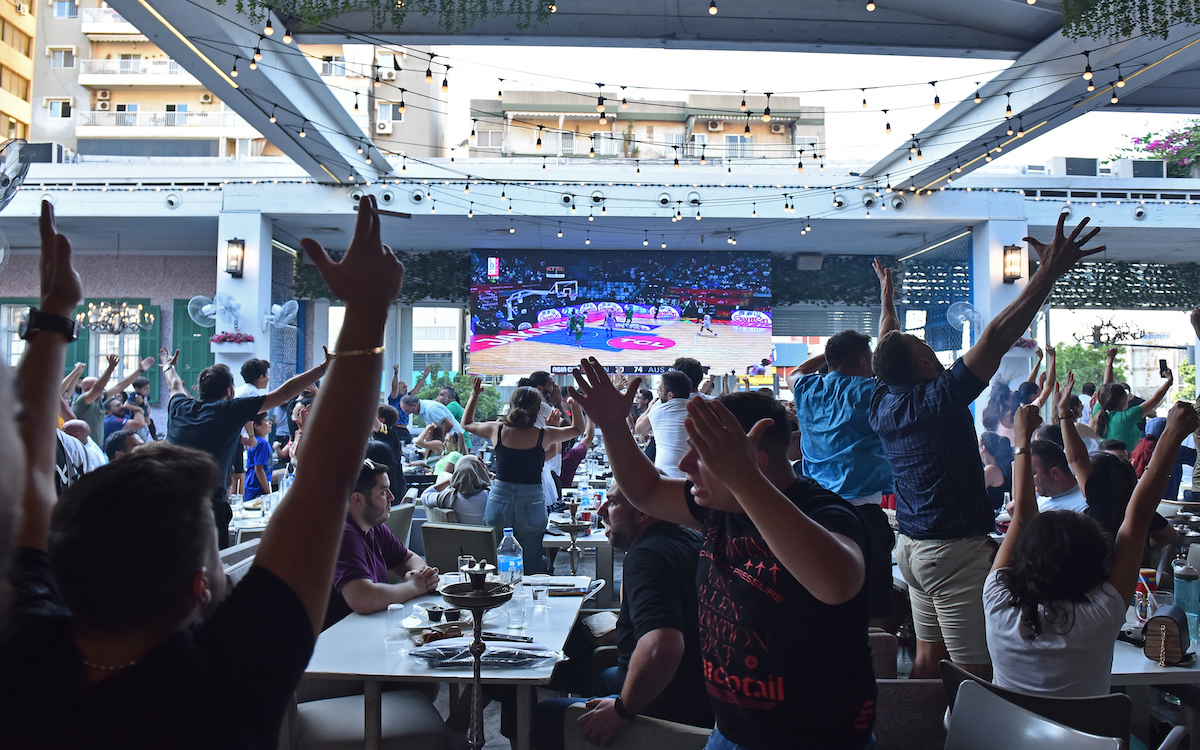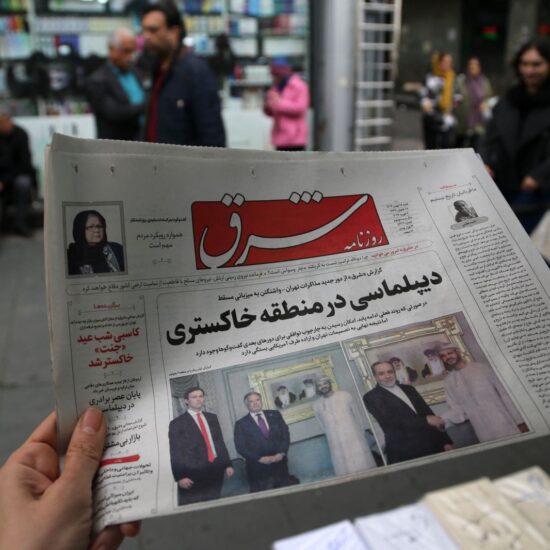
Since Lebanon’s economic crisis first started rearing its ugly head in late 2019, the country has faced crisis after crisis.
Electricity. Fuel. Water. Bread. Medicine. Politics.
Seemingly when one crisis ended, another one would begin, adding to the people’s misery.
There was little to nothing giving the Lebanese people any sort of reprieve from the constantly worsening economic crisis and whatever other crisis occurred in tandem.
Then, the International Basketball Association (FIBA) Asia Cup began.
Lebanon has a strong basketball team.
The Cedars dominated the qualifying and the competition, making it all the way to the final to play against Australia.
Even though Lebanon lost in the end, with Australia winning 75-73, the team succeeded in doing something that no one and nothing else could do up until this point.
They gave the Lebanese people hope. They gave them something that took their minds off of their daily struggles for a short period of time. They gave them something to be proud of for a change when all of the news is about how bad the situation is in Lebanon.
What a game, what a team, what a rush of emotions, it took me back to when we used to watch local basketball finals at home with the whole family glued to the TV. Look at how far our team made it. A very special and emotional sense of Lebanese pride right now. #Lebanon ♥️ pic.twitter.com/o9BNYTeWSm
— Luna Safwan – لونا صفوان (@LunaSafwan) July 24, 2022
Sure, the Cedars are not the Asia Cup champions, but they were still victorious in the eyes of the people.
This team served as a reminder that even though things might be extremely dark right now, there is always a small glimmer of hope.
In Lebanon
Funding boost: The US has approved two separate funds to help support Lebanon’s security forces amid the ongoing economic crisis.
The first fund is for $67 million and is funding that is being rerouted by the US State Department. The amount of money in the second fun has not been specified but will be for less than the $67 million.
The US has long supported Lebanon’s security forces as a way of maintaining stability in the country and as a sort of counter to Hezbollah’s armed wing of the party.
Lebanon’s army has struggled amid the economic crisis, with soldiers seeing their salaries slashed.
A symbol at risk: The silos at Beirut’s port are still in flames after two weeks of flaring up intermittently, and are at risk of collapsing. The likely risk is leading to condemnation by many Lebanese over the potential loss of evidence into the August 4 port explosion in 2020 and the loss of a memorial for those killed and injured in the explosion.
Opposition MPs held a sit-in in the vicinity of the port and silos where they called on the government to ensure that the fire is put out and its causes investigated.
The silos were heavily damaged in the explosion and are credited with preventing the western half of Beirut from being as severely damaged as its eastern neighborhoods.
For more on why the silos are so important to the Lebanese people, you can read Dana Hourany’s story on Beirut’s ground zero here.
Cat and mouse: Lebanese investigative judge Ghada Aoun raided the Central Bank on July 19 along with security forces as part of an investigation into the Bank’s head, Riad Salameh.
Salameh has been charged with illicit enrichment and money laundering, with several European countries also investigating the Central Bank chief for money laundering and embezzlement.
After receiving a judicial order to leave the premises, Aoun told the press that they did not find Salameh. Neither was he found at his home, which was also raided earlier that day.
Prime Minister-designate Najib Mikati called Aoun’s raid “brash” and said that there needs to be a political solution when it comes to the head of Lebanon’s bank before any legal actions are taken.
Negotiations continue: The US’s energy advisor, Amos Hochstein, is expected to visit Lebanon again by the end of the month, as Israel and Lebanon continue to negotiate their maritime borders.
The maritime border between the two countries has come under the spotlight once again after Israel announced that it was going to drill for fuel in the Karish field, an area that Lebanon initially argued was in disputed territory.
Since the announcement, Hezbollah sent three drones to survey the Israeli activity, which were ultimately shot down by Israeli forces. Israel’s caretaker prime minister, Yair Lapid, condemned Hezbollah’s actions, saying that his country was “prepared to act against any threat.”
Crossing the line: A Lebanese archbishop was questioned and arrested after he was arrested for crossing into Lebanon from Israel.
Moussa al-Hajj, who is the Maronite Archdiocese of Haifa and the patriarchal vicar for Jerusalem, Palestine and Jordan, was arrested at the Naqoura crossing between Israel and Lebanon after he visited his parish in the Holy Land.
He also had medicine, aid, and money that he had received from Lebanese families who left the country during the Israeli occupation that was meant for their families back in their home country, all of which were confiscated.
The Archbishop was interrogated by Lebanon’s General Security and could potentially face prosecution, something that Maronite Patriarch Bechara al-Rai said “violated the dignity of the church” and that al-Hajj could not be prosecuted without it first being referred to his authority.
It is unclear if al-Hajj will face any charges or consequences for his actions.
Burning heat: A fire started in the northern Akkar region of Lebanon on July 21 as much of the world faces record-breaking temperatures.
The fire began in the town of Qabaait, destroying the surrounding nature and getting dangerously close to people’s homes.
The fire was thought to have been extinguished the prior night, but sparked again the following day.
Beautiful Lebanon: Basketball was not the only thing giving the country a moment to stop worrying about their problems this weekend, as the annual Miss Lebanon pageant returned to screens across the country for the first time since 2018.
Setting aside the sexism of having an entire competition dedicated to judging women based on their looks and inherent problems there are with beauty pageants for a moment, many in Lebanon celebrated its return as it provided a brief return to normality.
Journalism student Yasmina Zeytoun was crowned the winner by the end of the night.
In the region
Tehran talks: Talks between Russian President Vladimir Putin, Turkish President Recip Tayyip Erdogan, and Iranian President Ebrahim Raisi in Tehran ended last week with commitments of mutual support.
Putin seemed to strengthen Russia’s relationship with Tehran while also making overtures to Turkey regarding grain exports through the Black Sea.
War in Syria was also a main issue on the table.
For the past two months, Erdogan has been threatening to launch another military operation into northern Syria, but last week’s talks seemed to suggest that he would not receive an enthusiastic green light from either Putin or Raisi.
Though Putin’s statement regarding a potential operation was far more vague than the one given by his Iranian counterpart, Erdogan still suggested he may go ahead with his plans.
However, no such operation has yet occurred.
Massacre in northern Syria: On Friday, July 22, a Russian airstrike near the town of Jisr al-Shughour in northern Syria killed seven civilians.
The strike destroyed the home of Ayhman Mozan and killed all four of his children.
In response, rebel groups in Idlib shelled Qardaha, the Assad family’s hometown.
This massacre of civilians in northern Syria is one of many that have occurred in the past year.
In October of 2021, government shells hit a market in Ariha, which is just south of Idlib city, and killed 11 people, including several children.
Though some say that the war in Syria is essentially over, killings like this are a reminder that, in fact, the war is ongoing, and civilians are still regularly killed in government strikes.
Based on last week’s talks in Tehran, this terrible status quo will likely continue, with low-intensity fighting occurring across almost all of northern Syria.
More of the same: Instability in Libya continues to escalate, with fighting in the Libyan capital of Tripoli killing 13 last week.
Libya has experienced on-and-off factional fighting since the fall of Muammar Gaddafi at the hands of NATO-backed rebels in 2011.
Most recently, Khalifa Haftar, the leader of the Libyan National Army based in the east of the country, launched an offensive on Tripoli in 2019, but his forces were pushed back after Turkey intervened the following year.
Since then, heavy fighting has been avoided, but clashes have continued nonetheless.
Eastern and western factions continue to oppose each other, with the country’s political and security instability continuing to deteriorate.
Atrocity in northern Iraq: A bustling tourist resort in northern Iraq’s Duhok province was rocked by explosions on Wednesday, July 20, killing nine tourists and wounding 23.
The victims included a one-year-old girl, two teenagers, and a newlywed husband.
Iraqi officials were quick to blame Turkey for the attack, but Ankara has denied this, saying instead that the real perpetrator was the Kurdistan Workers’ Party (PKK).
Turkey has intervened in northern Iraq on multiple occasions since the early 1990s, and in recent years it has established a more concrete military presence in the area.
Though the attack came only a day after Erdogan traveled to Tehran, Iranian elements within the Iraqi government seemed to be the most vocal in their disapproval, with some even calling for Turkey to fully withdraw from northern Iraq.
The final nail in the coffin: Today, July 25, Tunisians are heading to the polls for a referendum regarding a new constitution.
The referendum comes as Tunisia’s President, Qais Saied, made a number of moves to consolidate his power in Tunisian politics.
Winning in a landslide victory in 2019 by capturing 73% of the votes, Saied went on to issue an emergency declaration last July that fired the prime minister, froze the work of parliament for 30 days, and allowed him to assume all executive power.
Though today’s referendum is somewhat symbolic, many fear that Tunisia is returning to authoritarian rule under Saied.
Tunisia has often been described as the only success story of the Arab Spring, with many countries falling into civil war or quickly backsliding into authoritarianism.
The death of Tunisian democracy would be the last nail in the coffin for a dream that was born over 10 years ago that the region’s authoritarian dictatorships were coming to an end.
What we’re reading
Witnessing history: When a small civil war broke out in Lebanon in 1958, 13-year-old Ghassan Saab was living at his home in Choueifat when he watched the US military storm the beaches in an attempt to quell the violence. Now, he writes about his experiences with the soldiers and life in Lebanon during that time.
Membership revoked: Lebanon had its membership to the World Customs Organization frozen several weeks ago for not paying its dues. I looked at the potential implications that this will have for Lebanon.
From the streets to the ballot box: Lebanese activists have been in the streets for years trying to bring about change. It was not until the last few years that they decided that now was the time to try to change things from the inside. Gino Raidy writes about the opportunity that “change” groups and individuals have in the 2023 municipal elections.
Cutting up the capital: Should Beirut be split into two separate municipalities? Some politicians seem to think that would be a good idea. But is it really though and what is their reason for wanting to do this? NOW Lebanon’s Philippe Pernot has the answers to some of these questions.
The past and present collide: There has long been a debate over how tradition can fit in the modern world. In Tunisia, rising costs have made it harder and harder for couples to hold the extravagant traditional weddings that they grew up with, forcing them to have smaller ceremonies. Dana Hourany looks at the traditional wedding practices in Tunisia and the role that the modern world plays in it.
The next generation: After the self-proclaimed Islamic State’s territorial defeat in 2019, many wives and children of ISIS members have been stuck inside camps as their home countries refuse to repatriate them. The New York Times’s Charlie Savage looks at what fate awaits these children.
Lebanon+
Arakji claps back: After Lebanon won its game against Jordan in the semi-finals of the FIBA Asia Cup, Prime Minister-designate Najib Mikati congratulated the team on its victory.
However, not everyone welcomed Mikati’s comments, particularly the team captain, Wael Arakji, who said that he did not want the politician’s congratulations because they are “trying to clean the shit that he and his fellow politicians put us in.”
View this post on Instagram
Podcasts: Ronnie Chatah is taking his listeners on a journey through history with the latest episode of the Beirut Banyan. This week, Chatah spoke with Mohamad Tohmé about the urban development of post-war Lebanon.
A special thanks to David Isaly for helping with this week’s edition of the briefing.
Until next week, follow NOW Lebanon on Twitter, Instagram, Facebook, and LinkedIn, and subscribe to our weekly newsletter. And stay safe.









